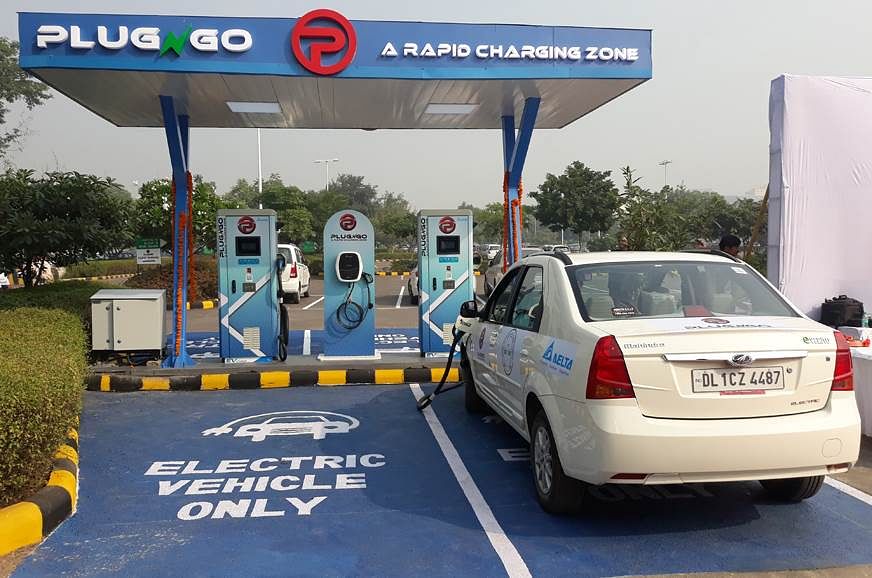Delhi government announces EV policy, projects 500,000 new BEVs by 2024
The Delhi EV Policy 2019 emphasises upon two-wheelers, electric three-wheelers and e-rickshaws in the initial phase to broaden the scope of clean mobility and bring about change in the city’s air pollution levels.
In a move aimed at slashing the high levels of air pollution in the national capital, the Delhi government has announced its Electric Vehicle Policy, which provides a plethora of incentives to new vehicle buyers if they think of the environment and choose to plug into EVs. The initiative will also bring about a boost to sales of EVs in the city.
The Delhi EV Policy, which was floated as a draft for discussions in November 2018, has been cleared by the Dialogue and Development Commission of Delhi (DDCD) under the supervision of Chief Minister Arvind Kejriwal and has been rolled out with various subsidies for different categories of vehicle. While the policy caters to all vehicle segments, special focus lies on electric two-wheelers and public transport including passenger-carrying electric three-wheelers and e-rickshaws, given their mass appeal.
Big benefits for electric two- and three-wheelers
Starting with electric two-wheelers, the government is offering incentives of Rs 5,000 per kWh of battery capacity, while also offering an additional incentive of Rs 5,000 for the scrappage of ICE two-wheelers. The policy also calls for a greater intake of electric two-wheelers for last-mile deliveries, such as food delivery and courier services, with an aim to convert these services to using only EVs by 2025. The government also authorised the use of electric two-wheelers by ride-hailing services.
The policy has also introduced incentives of Rs 30,000 on electric three-wheelers, along with a 5 percent subsidy on loans taken to procure the same. The government has also revealed its plans to have at least 50 percent of the new buses on Delhi roads to be EVs by 2024.
Coming to four-wheelers, there is an incentive of Rs 10,000 per kWh of battery capacity, with the total subsidy capped at Rs 150,000, but will only be made available for the first 1,000 EVs sold. Additionally, Delhi has waived registration fees and road tax on new EVs for the next three years.

Incentives on charging infrastructure
The policy has also introduced incentives for charging infrastructure, with the government offering a 100 percent subsidy on charging equipment costing up to Rs 6,000 per unit, subject to a limit of 30,000 chargers, for home or office use. The policy also calls for a 20 percent reservation at residential and commercial parking lots for electric vehicles.
The government has a target of 250 charging or battery-swapping stations across the city. With the new policy, the Delhi government is aiming to register up to 500,000 new EVs by 2024. Funds for the EV incentives will come via various cesses, road tax, and charges, with the government set to form a dedicated EV board to monitor and implement the new EV policy.
After the rollout of the policy, the automotive industry has been coming out in full force, giving its viewpoints, largely supportive to the announcements made.
According to Rajesh Menon, director general, SIAM, “We would like to congratulate the Delhi government for announcing a very comprehensive EV policy, which should encourage consumers to adopt EVs in the state of Delhi. Some of the welcome announcements in the policy include measures which would make EVs affordable and acceptable. These include purchase incentives, interest subvention, scrappage incentive, waiver on road tax, waiver on registration and parking fees and measures to push charging infrastructure. These are in line with the recommendations of SIAM.”
Giving his viewpoints, Sohinder Gill, CEO, Hero Electric and director general, SMEV, said, “We are delighted to see the Delhi government take the lead in making EVs more appealing to customers. On behalf of Hero Electric, I am thankful that the government considered most of our recommendations including the conversion of commercial ICE vehicles into electric, e-bike taxi and more such alternatives as they are the key drivers in taking the e-mobility momentum forward. These additional incentives apart from the subsidy offered by the central government would definitely encourage more people to make the switch to clean mobility. With the introduction of this policy, we are certain that Delhi will lead by example and am hopeful more states will also emulate such measures to give a boost to the industry and help achieve the country its ambitious goals of getting India electrified. If a similar policy is adopted at a national level, we are confident that the electric mobility revolution at a mass scale will kick-start in the country.”
Ayush Lohia, CEO, Lohia Auto Industries said: "It is a befitting move by the government of Delhi. This will help in faster adoption of e-mobility and help in curbing pollution levels that we have seen has crossed 400 AQI according to CPCB which is considered as hazardous in this month itself. Also this new policy will allow ride-hailing service providers to operate electric two-wheeler taxis in Delhi which is a big step-up for last-mile connectivity and job creation. The key criteria for this to succeed would be to build an appropriate infrastructure especially towards charging and swapping stations."
RELATED ARTICLES
Cosmo First diversifies into paint protection film and ceramic coatings
The Aurangabad, Maharashtra-based packaging materials supplier is leveraging its competencies in plastic films and speci...
JSW MG Motor India confident of selling 1,000 M9 electric MPVs in first year
The 5.2-metre-long, seven-seater luxury electric MPV, which will be locally assembled at the Halol plant in Gujarat, wil...
Modern Automotives targets 25% CAGR in forged components by FY2031, diversifies into e-3Ws
The Tier-1 component supplier of forged components such as connecting rods, crankshafts, tie-rods, and fork bridges to l...






 24 Dec 2019
24 Dec 2019
 9678 Views
9678 Views










 Autocar Professional Bureau
Autocar Professional Bureau




